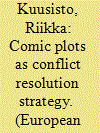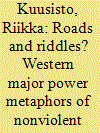|
|
|
Sort Order |
|
|
|
Items / Page
|
|
|
|
|
|
|
| Srl | Item |
| 1 |
ID:
092881


|
|
|
|
|
| Publication |
2009.
|
| Summary/Abstract |
Recently, the 'war stories' of the leaders of the major Western powers - the United States, Britain and France - have adhered to two major plots: the heroic epic or the sad tragedy. The heroic script defines and explains conflicts in which the Western powers have wished to play an active role: the Persian Gulf (1990-1), Kosovo (1999) and the current war against terrorism. The tragic plot has been employed when they have ruled out forceful outside intervention, like in Bosnia (1992-5) and Rwanda (1994). Both scripts are highly problematic conflict resolution approaches: they point to black-and-white, aggressive denouements. An alternative is the comic plot: a story traditionally used in ordinary disagreements among friends, problems with 'small foes' and disputes with important rivals. Adopting a comic framework for most of the conflicts in the world would give the Western leaders more room to negotiate, to try out new ideas and to back down on unsuccessful strategies.
|
|
|
|
|
|
|
|
|
|
|
|
|
|
|
|
| 2 |
ID:
092090


|
|
|
|
|
| Publication |
2009.
|
| Summary/Abstract |
Our conceptual systems are metaphorical in nature: We understand complex issues by comparing them with relatively straight-forward and familiar ones. Renowned experts of nonviolent problem solving, such as Mahatma Gandhi, Albert Luthuli, and Martin Luther King, Jr., have structured difficult conflicts in terms of roads, gardens, building projects, and riddles. The conflict rhetoric of leaders of the major Western powers-the United States, Britain, and France-is most often studied in violent contexts, vis-à-vis epic battles and tragic catastrophes. However, when dealing with mundane disputes among fundamentally like-minded parties, disagreements with petty challengers and debates with major powers with different political systems, for example, US, British, and French leaders employ many of the metaphors that nonviolence activists do. Understanding and expanding this sphere of comic conflict resolution-where ingenuity and reflection instead of black-and-white juxtaposition are the norm-is essential in the search for a more peaceful, yet vibrant world.
|
|
|
|
|
|
|
|
|
|
|
|
|
|
|
|
|
|
|
|
|